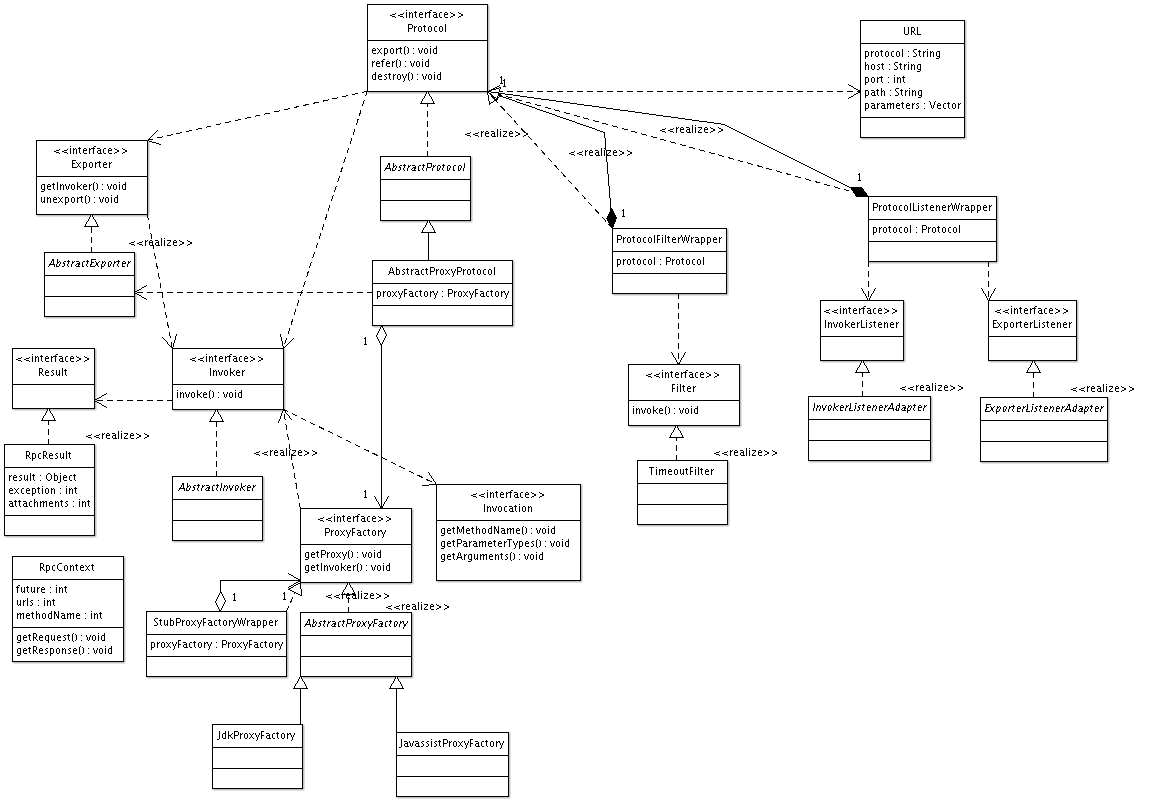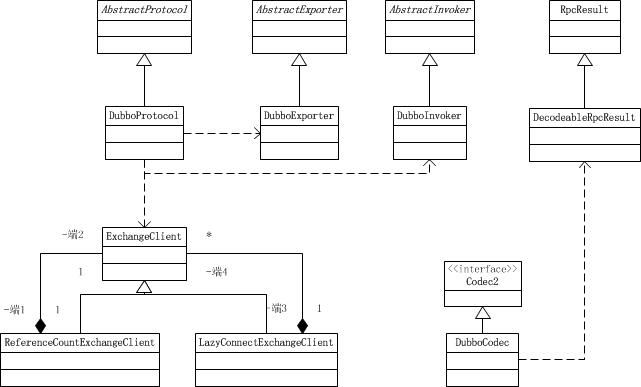Dubbo源码分析系列-服务的发布
RPC简化类图
服务发布过程
调用过程
上图是服务提供者暴露服务的主过程:
首先ServiceConfig类拿到对外提供服务的实际类ref(如:HelloWorldImpl),然后通过ProxyFactory类的getInvoker方法使用ref生成一个AbstractProxyInvoker实例,到这一步就完成具体服务到Invoker的转化。接下来就是Invoker转换到Exporter的过程。
Dubbo处理服务暴露的关键就在Invoker转换到Exporter的过程(如上图中的红色部分),Dubbo协议的Invoker转为Exporter发生在DubboProtocol类的export方法,它主要是打开socket侦听服务,并接收客户端发来的各种请求,通讯细节由Dubbo自己实现。
案例介绍
从上面知道,利用Spring的解析收集到dubbo:service、dubbo:registry等标签的配置,然后将这些配置都存至ServiceConfig,RegistryConfig中,然后调用ServiceConfig的export()方法来进行服务的发布与注册
先看一个简单的服务端例子,dubbo配置如下:
application name="helloService-app" />
"zookeeper" address="127.0.0.1:2181" />
"com.demo.dubbo.service.HelloService" ref="helloService" />
id="helloService" class="com.demo.dubbo.server.serviceimpl.HelloServiceImpl"/> - 有一个服务接口HelloService,以及它对应的实现类HelloServiceImpl
- 将HelloService标记为dubbo服务,使用HelloServiceImpl对象来提供具体的服务
- 使用zooKeeper作为注册中心
服务发布过程
一个服务可以有多个注册中心,多个服务协议
多注册中心信息(注册的是整个application):
首先根据注册中心配置,即上述的ZooKeeper配置信息聚合在一个URL对象中,内容如下:
registry://127.0.0.1:2181/com.alibaba.dubbo.registry.RegistryService?application=helloService-app&localhost=true®istry=zookeeper多协议信息(提供具体服务):
由于上述我们没有配置任何协议信息,就会使用默认的dubbo协议,开放在20880端口,也就是在该端口,对外提供上述的HelloService服务,注册的协议信息也转化成一个URL对象,如下:
dubbo://127.0.0.1:20880/com.demo.dubbo.service.HelloService?anyhost=true&application=helloService-app&dubbo=2.0.13&interface=com.demo.dubbo.service.HelloService&methods=hello&prompt=dubbo&revision=把注册中心信息和协议信息组合起来,依次来进行服务的发布,整个过程的伪代码如下:
//获取注册中心信息
List registryURLs = loadRegistries();
for (ProtocolConfig protocolConfig : protocols) {
//根据每一个协议配置构建一个URL
URL url = new URL(name, host, port, (contextPath == null || contextPath.length() == 0 ? "" : contextPath + "/") + path, map);
for (URL registryURL : registryURLs) {
String providerURL = url.toFullString();
//将协议信息添加到注册中心信息后面
Invoker invoker = proxyFactory.getInvoker(ref, (Class) interfaceClass, registryURL.addParameterAndEncoded(RpcConstants.EXPORT_KEY, providerURL));
Exporter exporter = protocol.export(invoker);
}
} 所以服务发布过程大致分成3步:
- 获取注册中心信息,构建协议信息,然后将其组合
- 通过ProxyFactory将HelloServiceImpl封装成一个Invoker执行
- 使用Protocol将invoker导出成一个Exporter(包括去注册中心注册服务等)
这里面就涉及到几个大的概念,ProxyFactory、Invoker、Protocol、Exporter,下面来一一介绍
概念介绍
Invoker
Invoker,一个可执行对象,能够根据方法名称、参数得到相应的执行结果。接口如下:
public interface Invoker {
Class getInterface();
URL getUrl();
Result invoke(Invocation invocation) throws RpcException;
void destroy();
} 而Invocation则包含了需要执行的方法、参数等信息,接口如下:
public interface Invocation {
URL getUrl();
String getMethodName();
Class[] getParameterTypes();
Object[] getArguments();
}目前其实现类只有一个RpcInvocation
Invoker这个可执行对象的执行过程分成三种类型:
- 本地执行的Invoker
- 远程通信执行的Invoker
- 多个类型2的Invoker聚合成的集群版Invoker
以HelloService接口为例:
- 本地执行的Invoker:server端,含有对应的HelloServiceImpl实现,要执行该接口方法,仅仅只需要通过反射执行HelloServiceImpl对应的方法即可
- 远程通信执行的Invoker: client端,要想执行该接口方法,需要需要进行远程通信,发送要执行的参数信息给server端;server端,利用上述本地执行的Invoker执行相应的方法,然后将返回的结果发送给client端。这整个过程算是该类Invoker的典型的执行过程
- 集群版的Invoker:client端,拥有某个服务的多个Invoker,此时client端需要做的就是将多个Invoker聚合成一个集群版的Invoker,client端使用的时候,仅仅通过集群版的Invoker来进行操作。集群版的Invoker会从众多的远程通信类型的Invoker中选择一个来执行(从中加入负载均衡、服务降级等策略),类似服务治理,dubbo已经实现了
ProxyFactory
对于Server端,主要负责将服务如HelloServiceImpl统一进行包装成一个Invoker,通过反射来执行具体的HelloServiceImpl对象的方法
接口定义如下:
@SPI("javassist")
public interface ProxyFactory {
//针对client端,创建出代理对象
@Adaptive({Constants.PROXY_KEY})
T getProxy(Invoker invoker) throws RpcException;
//针对server端,将服务对象如HelloServiceImpl包装成一个Invoker对象
@Adaptive({Constants.PROXY_KEY})
Invoker getInvoker(T proxy, Class type, URL url) throws RpcException;
} ProxyFactory的接口实现有JdkProxyFactory、JavassistProxyFactory,默认是JavassistProxyFactory, JavassistProxyFactory内容如下:
public class JavassistProxyFactory extends AbstractProxyFactory {
@SuppressWarnings("unchecked")
public T getProxy(Invoker invoker, Class[] interfaces) {
return (T) Proxy.getProxy(interfaces).newInstance(new InvokerInvocationHandler(invoker));
}
public Invoker getInvoker(T proxy, Class type, URL url) {
// TODO Wrapper类不能正确处理带$的类名
final Wrapper wrapper = Wrapper.getWrapper(proxy.getClass().getName().indexOf('$') < 0 ? proxy.getClass() : type);
return new AbstractProxyInvoker(proxy, type, url) {
@Override
protected Object doInvoke(T proxy, String methodName,
Class[] parameterTypes,
Object[] arguments) throws Throwable {
return wrapper.invokeMethod(proxy, methodName, parameterTypes, arguments);
}
};
}
} 可以看到创建了一个AbstractProxyInvoker(这类就是本地执行的Invoker),AbstractProxyInvoker对invoke()方法的实现如下:
public Result invoke(Invocation invocation) throws RpcException {
try {
return new RpcResult(doInvoke(proxy, invocation.getMethodName(), invocation.getParameterTypes(), invocation.getArguments()));
} catch (InvocationTargetException e) {
return new RpcResult(e.getTargetException());
} catch (Throwable e) {
throw new RpcException("Failed to invoke remote proxy method " + invocation.getMethodName() + " to " + getUrl() + ", cause: " + e.getMessage(), e);
}
}综上所述,服务发布的第二个过程就是:使用ProxyFactory将HelloServiceImpl封装成一个本地执行的Invoker
Protocol
从上面得知服务发布的第一、二个过程:
- 获取注册中心信息dubbo:registry和协议信息dubbo:protocol
- 使用ProxyFactory将HelloServiceImpl封装成一个本地执行的Invoker
执行这个服务->执行这个本地的Invoker->调用AbstractProxyInvoker.invoke(Invocation invocation)方法,方法的执行过程就是通过反射执行HelloServiceImpl。
现在的问题是:客户端如何调用服务端的方法(服务注册到注册中心->客户端向注册中心订阅服务->客户端调用服务端的方法)和上述Invocation参数的来源问题
对于Server端来说,上述服务发布的第3步中Protocol要解决的问题是:根据指定协议向注册中心注册HelloService服务;当客户端根据协议调用这个服务时,将客户端传递过来的Invocation参数交给上述的Invoker来执行。所以Protocol会加入远程通信这块,根据客户端的请求来获取参数Invocation。
先来看下Protocol接口的定义:
@SPI("dubbo")
public interface Protocol {
int getDefaultPort();
//针对server端来说,将本地执行类的Invoker通过协议暴漏给外部。这样外部就可以通过协议发送执行参数Invocation,然后交给本地Invoker来执行
@Adaptive
Exporter export(Invoker invoker) throws RpcException;
//这个是针对客户端的,客户端从注册中心获取服务器端发布的服务信息
//通过服务信息得知服务器端使用的协议,然后客户端仍然使用该协议构造一个Invoker。这个Invoker是远程通信类的Invoker。
//执行时,需要将执行信息通过指定协议发送给服务器端,服务器端接收到参数Invocation,然后交给服务器端的本地Invoker来执行
@Adaptive
Invoker refer(Class type, URL url) throws RpcException;
void destroy();
} 我们再来详细看看服务发布的第3步(ServiceConfig):
Exporter exporter = protocol.export(invoker);protocol的来历是:
Protocol protocol = ExtensionLoader.getExtensionLoader(Protocol.class).getAdaptiveExtension();我们从文章Dubbo源码分析系列-扩展机制的实现就分析过,上述protocol是一个动态实现者
public com.alibaba.dubbo.rpc.Exporter export(com.alibaba.dubbo.rpc.Invoker arg0) throws com.alibaba.dubbo.rpc.RpcException{
if (arg0 == null) {
throw new IllegalArgumentException("com.alibaba.dubbo.rpc.Invoker argument == null");
}
if (arg0.getUrl() == null) {
throw new IllegalArgumentException("com.alibaba.dubbo.rpc.Invoker argument getUrl() == null");
}
com.alibaba.dubbo.common.URL url = arg0.getUrl();
String extName = ( url.getProtocol() == null ? "dubbo" : url.getProtocol() );
if(extName == null) {
throw new IllegalStateException("Fail to get extension(com.alibaba.dubbo.rpc.Protocol) name from url(" + url.toString() + ") use keys([protocol])");
}
com.alibaba.dubbo.rpc.Protocol extension = (com.alibaba.dubbo.rpc.Protocol)com.alibaba.dubbo.common.ExtensionLoader.getExtensionLoader(com.alibaba.dubbo.rpc.Protocol.class).getExtension(extName);
return extension.export(arg0);
}
public com.alibaba.dubbo.rpc.Invoker refer(java.lang.Class arg0,com.alibaba.dubbo.common.URL arg1) throws com.alibaba.dubbo.rpc.RpcException{
if (arg1 == null) {
throw new IllegalArgumentException("url == null");
}
com.alibaba.dubbo.common.URL url = arg1;
String extName = ( url.getProtocol() == null ? "dubbo" : url.getProtocol() );
if(extName == null) {
throw new IllegalStateException("Fail to get extension(com.alibaba.dubbo.rpc.Protocol) name from url(" + url.toString() + ") use keys([protocol])");
}
com.alibaba.dubbo.rpc.Protocol extension = (com.alibaba.dubbo.rpc.Protocol)com.alibaba.dubbo.common.ExtensionLoader.getExtensionLoader(com.alibaba.dubbo.rpc.Protocol.class).getExtension(extName);
return extension.refer(arg0, arg1);
}export(Invoker invoker)的过程即根据Invoker中url的信息来最终选择Protocol的实现,默认实现是DubboProtocol,然后再对DubboProtocol进行依赖注入,进行wrap包装(getExtension()方法)
Protocol的实现情况:

可以看到在返回DubboProtocol之前,经过了ProtocolFilterWrapper、ProtocolListenerWrapper、RegistryProtocol的包装
所谓包装就是如下内容:
package com.alibaba.xxx;
import com.alibaba.dubbo.rpc.Protocol;
public class XxxProtocolWrapper implemenets Protocol {
Protocol impl;
public XxxProtocol(Protocol protocol) { impl = protocol; }
// 接口方法做一个操作后,再调用extension的方法
public Exporter<T> export(final Invoker<T> invoker) {
//... 一些操作
impl .export(invoker);
// ... 一些操作
}
// ...
}使用装饰器模式,类似AOP的功能
下面主要讲解RegistryProtocol和DubboProtocol,先暂时忽略ProtocolFilterWrapper、ProtocolListenerWrapper
RegistryProtocol.export()主要功能是将服务注册到注册中心
DubboProtocol.export()服务导出功能:
- 创建一个DubboExporter,封装Invoker
- 根据Invoker的url获取ExchangeServer通信对象(负责与客户端的通信模块)
现在我们搞清楚我们的目的,通过通信对象获取客户端传来的Invocation参数,然后找到对应的DubboExporter(即能够获取到本地Invoker)就可以执行服务了
在DubboProtocol中,每个ExchangeServer通信对象都绑定了一个ExchangeHandler对象,内容如下:
private ExchangeHandler requestHandler = new ExchangeHandlerAdapter() {
public Object reply(ExchangeChannel channel, Object message) throws RemotingException {
if (message instanceof Invocation) {
Invocation inv = (Invocation) message;
Invoker invoker = getInvoker(channel, inv);
RpcContext.getContext().setRemoteAddress(channel.getRemoteAddress());
......
return invoker.invoke(inv);
}
throw new RemotingException(channel, "Unsupported request: " + message == null ? null : (message.getClass().getName() + ": " + message) + ", channel: consumer: " + channel.getRemoteAddress() + " --> provider: " + channel.getLocalAddress());
}
};可以看到该类才是真正与客户端通信,在获取到Invocation参数后,调用getInvoker()来获取本地的Invoker(先从exporterMap中获取Exporter),就可以调用服务了
而对于通信这块,接下来会专门来详细的说明,从reply参数可知,重点在了解ExchangeChannel
Exporter
负责维护invoker的生命周期,包含一个Invoker对象,接口定义如下:
public interface Exporter {
Invoker getInvoker();
void unexport();
} 结束语
本文简略地介绍了及服务发布过程中的几个概念,接下来的打算是:
- 客户端订阅服务与使用服务设计的概念
- 注册中心模块
- 客户端与服务端网络通信模块



